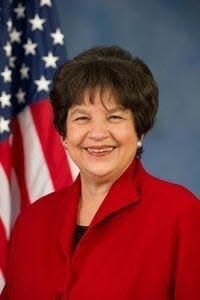As Florida's strict abortion ban takes effect, look to November and vote to overturn it
This week marks the beginning of a dark, life-threatening new chapter for women in Florida. It’s when Florida’s new six-week abortion ban, one of the strictest and most far-reaching in the country, becomes law. With abortion outlawed after six weeks, before many women even know that they are pregnant, women are robbed of the freedom to make their own decisions about their health, lives, and futures. Doctors who perform abortions can now face potential fines and up to five years in prison.
The consequences will be dire. No longer will women in Florida have the freedom to decide when or if to start or grow a family. It could be a fourteen-year-old who was raped by her uncle and is forced to carry his child. It could be a mother with children, who can barely afford to put food on the table. It could be a young woman in school with hopes and dreams for a career. It could be a woman dying of sepsis because doctors feared the legal repercussions of providing her with the care she needed. These aren’t hypothetical scenarios. We have already watched them play out across our country, in states where abortion is banned or severely restricted.
More on reproductive choice: Abortion is on the Florida ballot this election. Protect women’s right to choose.
The Florida six-week ban will affect millions of women across the South. Since the fall of Roe, Florida had served as the last option for women in nearby states needing abortions. Abortion is now banned or severely restricted in Mississippi, Alabama, Tennessee, Arkansas, Louisiana. If you live in Palm Beach County, you will now have to travel hundreds of miles to receive the care you need — because there is nowhere nearby to go. States that still allow abortion will see a dramatic increase in demand for care, and providers may not be able to accommodate every patient.
The six-week ban will impact women who need abortions, as well as women needing any type of maternal care. Nearly one-third of Florida counties are already without a single OB/GYN. As more doctors fear punishment for providing necessary care, even finding providers to deliver babies may become difficult. The impact? Imagine no doctors available to deliver babies. Alarmingly, women are nearly three times as likely to die during pregnancy or childbirth in states with abortion bans than in those with full access. This is the reality that our state is about to face.
More on abortion rights: Florida abortion ban might cause women to make scary decisions, and history proves it.
Yet, this November, you can save lives. There will be an amendment on our state’s ballot that, if passed, will establish a right to abortion until fetal viability (approximately 24 weeks) in Florida’s Constitution. It will require a 60 percent vote to pass. Florida Amendment 4, the Right to Abortion Initiative, would go into effect in January 2025 and would overrule the six-week ban.
If you need more information on how to cast your vote this fall, you can head to votepalmbeach.gov. If you plan on voting by mail, you’ll have to request your ballot ahead of time, even if you’ve voted by mail in past elections.
Millions of women will wake up on May 1 without a fundamental freedom that they had the day before. Floridians have an opportunity to take that freedom back this fall. In the meantime, I’ll continue fighting in Congress for women’s rights to access the health care they need — in Florida and across the nation.

This article originally appeared on Palm Beach Post: Florida abortion ban takes effect; vote in November to protect rights
